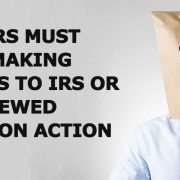Facing A Surprise Tax Bill? Here Is Why You Should Still File Your 2021 Income Tax Return By April 18th.
Facing A Surprise Tax Bill? Here Is Why You Should Still File Your 2021 Income Tax Return By April 18th.
Why You Should Not Disregard The April 18, 2022 Filing Deadline
The most important thing everyone with a tax liability should do is file a return by the April 18th due date, even if they can’t pay in full, or request a six-month extension to avoid higher penalties for failing to file on time. Though automatic tax-filing extensions are available to anyone who wants one but keep in mind that these extensions don’t change the payment deadline. They act an extension to file and not as an extension to pay. With the extension you can include payment for what you can pay now to help reduce a potential late-payment penalty and interest charges.
Usually anyone who owes tax and waits until after that date to file will be charged a late-filing penalty of 5% per month. So, if a tax return is done, filing it by April 18th is always less costly, even if the full amount due can’t be paid on time.
Pay what you can
Interest, plus the much smaller late-payment penalty, will apply to any payments made after April 18th. Making a payment, even a partial payment, will help limit penalty and interest charges. You should also consider other options for payment, including getting a loan to pay the amount due. In many cases, loan costs may be lower than the combination of interest and penalties the IRS must charge under federal law. Normally, the late-payment penalty is one-half-of-one percent (0.5%) per month. The interest rate, adjusted quarterly, is currently 3% per year, compounded daily.
IRS payment plans
There are two main types of payment plans that do not require the submission of financial disclosures.
They are:
- Short-term payment plan – The payment period is 120 days or less and the total amount owed is less than $100,000 in combined tax, penalties and interest. A 180-day payment plan is also possible. However, as you are financing a liability with IRS, interest and the late-payment penalty continue to apply.
- Long-term payment plan – The payment period is longer than the short-term payment plan. Payments are made monthly, and the amount owed must be less than $50,000 in combined tax, penalties and interest. In addition, for anyone who filed their return on time, the late-payment penalty rate is cut in half while an installment agreement is in effect. This means that the penalty accrues at the rate of one-quarter-of-one percent (0.25%) per month, instead of the usual one-half-of-one percent (0.5%) per month.
Taxpayers who do not qualify for either of these plans would be requires to submit financial disclosures in order to arrange for a payment plan with IRS.
Other options to consider:
Delayed collection
If the IRS determines a taxpayer is unable to pay, it may delay collection until their financial condition improves. Sometimes this is referred to as putting a taxpayer’s account on a Currently Not Collectible (CNC) status. Once the account is placed on a CNC status, the IRS does not pursue collection activity against the taxpayer and the statute of limitations on the tax liabilities will continue to run. Additionally, the total amount owed will still increase because penalties and interest are charged until paid in full or otherwise settled. Generally, unless the taxpayer’s financial situation changes, the account will remain on a CNC status until the tax liabilities expire. However, if the taxpayer’s financial situation improves the account will be taken off of CNC status so that the IRS can collect the taxes through full payment or an Installment Agreement.
Penalty relief
Some taxpayers qualify to have their late-filing or late-payment penalties reduced or eliminated. This can be done on a case-by-case basis, based on “reasonable cause”. Alternatively, where a taxpayer has filed and paid on time during the past three years, the IRS can typically provide relief under the “First Time Abatement Program”.
Offer in Compromise
Established by the Internal Revenue Service, the Offer in Compromise Program is a formal application to the IRS requesting that it accept less than full payment for what you owe in taxes, interest, and penalties. An offer in compromise may allow you to settle back taxes or IRS liability at a substantial discount on the basis of doubt as to collectability, liability, or effective tax administration. In addition, while your offer is under consideration, the Internal Revenue Service is prohibited from instituting any levies of your assets and wages.
While an offer in compromise can help pay IRS debt for less, most people do not have the necessary skills or knowledge of the IRS collection process to make an offer in compromise that is in their best interest. Many people fill out the forms incorrectly, overstate their assets and income, and offer too much. Government figures show that 75% of offers are returned at the beginning due to forms being filled out incorrectly, and of the 25% that are processed, approximately 50% are rejected.
What Should You Do?
Individual taxpayers can file an extension using Form 4868. Extensions can also be filed online, which has the benefit that you’ll receive a confirmation code from the IRS notifying you that your extension was received. Then you should promptly contact tax counsel. Let the tax attorneys at the Law Offices Of Jeffrey B. Kahn, P.C. located in Orange County (Irvine), Los Angeles and offices elsewhere in California get you set up with a plan that may include being qualified into a voluntary disclosure program to avoid criminal prosecution, seek abatement of penalties, and minimize your tax liability. If you are involved in cannabis, check out what else a cannabis tax attorney can do for you. Also, if you are involved in crypto currency, check out what a Bitcoin tax attorney can do for you.





 Follow
Follow Follow
Follow